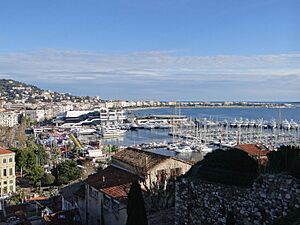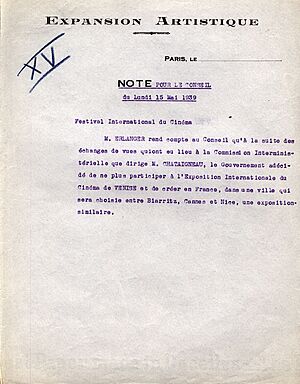Cannes Film Festival facts for kids
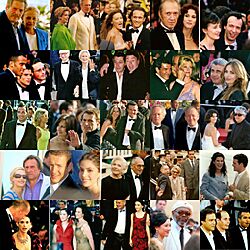 |
|
| Location | Cannes, France |
|---|---|
| Founded | 31 August 1939 (as International Film Festival) |
| Awards | Palme d'Or, Grand Prix |
| Artistic director | Thierry Frémaux |
The Cannes Film Festival is a super famous film festival held in France. It's known as one of the most important film events in the world. It takes place every year in Cannes, France. Filmmakers from all over the world show their new movies, including documentaries, at the festival.
It started in 1946 and usually happens in May. Only people who are invited can attend. The main events happen at the Palais des Festivals et des Congrès. Cannes is one of the biggest and most important film festivals in the world. It's often grouped with other major festivals like Venice and Berlin.
Contents
History of the Cannes Film Festival
How the Festival Began
The idea for the Cannes Film Festival started in 1938. A French government official named Jean Zay, along with Philippe Erlanger and Robert Favre Le Bret, wanted to create an international film festival. They got support from people in America and Britain.
At that time, the only big international film festival was in Venice, Italy. However, people felt that the Venice festival was not fair. Its awards were sometimes influenced by political leaders like Benito Mussolini and Adolf Hitler. For example, in 1938, two films with political messages won top awards, even though the rules should have prevented it.
Because of this unfairness, French, British, and American jury members left the Venice festival in protest. This made them want to create a new, fair festival. So, on May 31, 1939, the city of Cannes was chosen to host this new event. Cannes was picked because it's a popular tourist spot on the French Riviera. The city also promised to help pay for the festival and build a special place for it.
The First Festival and World War II
Many famous Hollywood stars like Gary Cooper, Marlene Dietrich, and James Cagney came to Cannes for the first festival. They even arrived on a special ship! On August 31, 1939, the festival officially began with a private showing of the American film The Hunchback of Notre Dame.
However, the very next day, September 1, German troops invaded Poland. This started World War II. The festival was first postponed, then completely cancelled. France and the United Kingdom declared war on Germany, and the country needed all its people for the war effort.
The festival was finally relaunched in 1946. From September 20 to October 5, 1946, films from 21 countries were shown at the first official Cannes International Film Festival. In 1949, a new building called the Palais des Festivals was built especially for the event. In 1951, the festival moved to spring to avoid clashing with the Venice Festival.
Growing in the 1950s and 1960s
In the early 1950s, the Cannes Film Festival became very popular. It attracted many tourists and a lot of media attention. It also started to become more focused on the artistic side of filmmaking. New awards were created, like the Critics' Prize, for unique and brave films.
In 1955, the famous Palme d'Or (Golden Palm) award was introduced. This award replaced the Grand Prix du Festival as the top prize. In 1959, the Marché du Film (Film Market) was started. This market allowed people in the film industry to buy and sell movies, making the festival a big place for film business.
In 1962, the International Critics' Week began. This section was created by film critics to show new films from directors around the world. It focused on movies that were not just made for commercial reasons. In 1968, the festival was stopped early because of protests happening across France. Filmmakers supported students and workers who were on strike. This led to the creation of the Directors' Fortnight in 1969. This new section shows a selection of independent films from around the world.
Changes in the 1970s and 1980s
The 1970s brought more important changes to the festival. In 1972, new leaders made changes to how films were chosen. They wanted to pick films based on their artistic quality, not on political reasons. Before this, different countries chose which films would represent them. But in 1972, a special committee was created to select films for the festival.
In 1978, Gilles Jacob became the new General Delegate. He introduced the Caméra d'Or award for the best first film shown at the festival. He also created the Un Certain Regard section, which features unique and different films. The festival was also made shorter, lasting only 13 days. The jury, which decides the awards, started to include more celebrities and film professionals.
In 1983, a much bigger Palais des Festivals et des Congrès was built to host the festival. In 1987, a red carpet was used at the entrance of the Palais for the first time. This became a famous tradition.
From the 1990s to Today
In 1998, Gilles Jacob created the Cinéfondation section. This part of the festival helps new filmmakers from around the world. It supports young directors and helps them get funding for their films. In 2002, the festival officially changed its name to Festival de Cannes.
In the 2000s, the festival started to focus more on new technology in film, especially digital filmmaking. In 2004, a section called Cannes Classics was created. It shows old, restored films and documentaries. In 2007, Thierry Frémaux became the General Delegate. He also helped expand the festival to other cities, like Buenos Aires.
In 2020, the Cannes Film Festival was postponed and then cancelled because of the COVID-19 pandemic. Director Spike Lee was supposed to lead the jury that year. He later led the jury for the 2021 Cannes Film Festival. In 2022, Iris Knobloch became the first woman president of the festival.
Festival Team
| Year | President | General Delegate | General Secretary | |
|---|---|---|---|---|
| 1949 | – | – | Jean Touzet | |
| 1952 | Robert Favre Le Bret | |||
| 1972 | Robert Favre Le Bret |
Maurice Bessy | ||
| 1978 | Gilles Jacob | |||
| 1984 | Pierre Viot | |||
| 1985 | Michel P. Bonnet | |||
| 1991 | François Erlenbach |
|||
| 2001 | Gilles Jacob | General Director Véronique Cayla |
Artistic Delegate Thierry Frémaux |
|
| 2005 | Catherine Démier | |||
| 2007 | Thierry Frémaux | |||
| 2014 | Pierre Lescure | |||
| 2017 | ||||
| 2020 | François Desrousseaux | |||
| 2022 | Iris Knobloch | |||
The president of the festival is chosen by the festival's board of directors. This board includes important people from the film world and government officials who help fund the event. The president serves for three years and can be re-elected. They also choose their team members, like the general delegate.
The general delegate is in charge of coordinating all the events at the festival. When Gilles Jacob became president in 2001, two new roles were created: a general director to manage the event and an artistic director to select the films. However, in 2007, Thierry Frémaux became the general delegate again, taking on both roles. The general secretary handles things like receiving film submissions and other practical matters.
Festival Programmes
The Cannes Film Festival has different sections where films are shown:
- The Official Selection – This is the main part of the festival.
- In Competition – These are the films competing for the Palme d'Or, the top prize. They are shown in the Théâtre Lumière.
- Un Certain Regard – This section features unique and different films from various cultures. They are shown at the Salle Debussy.
- Out of Competition – These films are shown at special gala screenings but do not compete for the main awards.
- Midnight Screenings – These films are shown late at night at the Théâtre Lumière but are not part of the main competition.
- Cannes Premieres – These films are shown at the Salle Debussy but do not compete for awards.
- Special Screenings – These films are chosen for their unique style and are shown in a special setting.
- Cinéfondation – This section presents about 15 short and medium-length films from film schools around the world.
- Short Films – Short films compete for the Short Film Palme d'Or. About 10 films are usually in this competition.
- Cannes Classics – This section celebrates old films. It shows classic movies that have been restored to look new again.
- Cinéma de la Plage – Classic and new films are shown on Macé beach for everyone to enjoy. These screenings often include film music.
- Parallel Sections – These are other programmes that explore different kinds of cinema.
- International Critics' Week – Since 1962, this section has focused on finding new talent. It shows first and second films by directors from all over the world.
- Directors' Fortnight – Since 1969, this section has shown avant-garde films. It has become a place where the Cannes Festival often finds its famous directors.
- ACID (Association for Independent Cinema and its Distribution) – This section supports independent films.
- Tous les Cinémas du Monde – This section shows the variety of cinema from around the world. Each day, a different country is invited to present its films and celebrate its culture.
- Events
- Marché du Film – This is the busiest film market in the world. It's a place where people buy and sell films. It also has a program called impACT, which talks about important social topics like making film production more environmentally friendly.
- Masterclasses – Famous filmmakers give talks and lessons to the public.
- Tributes – These events honor internationally known artists. They receive an award and one of their films is shown.
- Producers Network – This is a chance for filmmakers to find partners for international film projects.
- Exhibitions – Each year, an artist or a film theme is featured in an exhibition.
Juries
Before the festival begins, the board of directors chooses the juries. These juries are the only ones who decide which films will win awards. Jury members are chosen from famous international artists, based on their work and respect from others. The president of the jury is chosen after several proposals are reviewed by the board.
- Feature Films – This international jury has a president and other film or art professionals. They decide the prizes for the main feature films in Competition.
- Cinéfondation and Short Films – This jury has a president and four film professionals. They award the Short Film Palme d'Or and the three best films from the Cinéfondation.
- Un Certain Regard – This jury includes a president, journalists, film students, and industry professionals. They give the Un Certain Regard Prize for the best film in that section and can also honor two other films.
- Caméra d'Or – This jury has a president, film directors, technicians, and critics. They award the best first film shown at the festival, from any of the main sections.
The juries meet every year at the historic Villa Domergue to choose the winners.
Awards
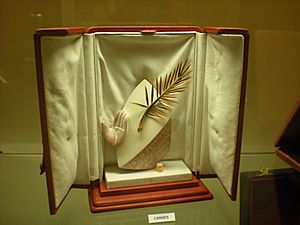
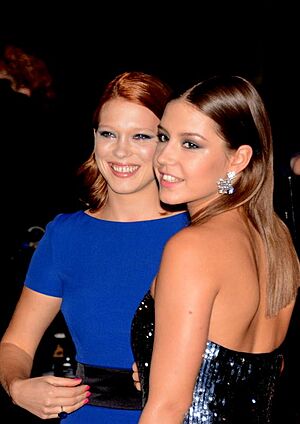
The most important award at Cannes is the Palme d'Or ("Golden Palm") for the best film.
- Competition Awards
- Palme d'Or – The Golden Palm, for the best film.
- Palme d'Or du court métrage – Best Short Film.
- Grand Prix – The Grand Prize of the Festival.
- Prix du Jury – The Jury Prize.
- Prix de la mise en scène – Best Director.
- Prix d'interprétation masculine – Best Actor.
- Prix d'interprétation féminine – Best Actress.
- Prix du scénario – Best Screenplay.
- Other Section Awards
- Prix Un Certain Regard – For young talent and brave, new films.
- Cinéfondation prizes – For student films.
- Caméra d'Or – For the best first film shown at the festival.
- Awards Given by Independent Groups
- FIPRESCI Prize – Given by international film critics.
- Directors' Fortnight Prizes
- PRIX CST de l'Artiste Technicien – Awarded to a technical artist.
- International Critics' Week Prizes
- Prize of the Ecumenical Jury
- François Chalais Prize
- L'Œil d'or – Best documentary film.
- Trophée Chopard
- Palm Dog – For the best performance by a dog in a film.
- Queer Palm – For the best LGBT-related films.
- Cannes Soundtrack Award
- Pierre Angénieux Excellens in Cinematography
- Women in Motion – Honors people who raise awareness about women's issues in the film industry.
Impact of the Festival
The Cannes Film Festival is very important for European films. It helps to show off European movies and sell them around the world. It also helps people see European cinema as "art" films.
Because of all the media attention, many stars attend the festival. It's a popular place for film producers to launch their new movies. They also try to sell their films to distributors who come from all over the world.
Cannes Film Festival in Stories
The festival has been featured in many fictional stories. For example, Michael Grothaus' book Epiphany Jones is a story about the festival and the film industry. Paulo Coelho's book The Winner Stands Alone is also set at the Cannes Film Festival.
The festival has also been the setting for several movies. These include The Last Horror Film (1982), La cité de la peur (1994), Festival in Cannes (2001), Femme Fatale (2002), and Mr. Bean's Holiday (2007). Some of these films were even shot at the festival itself.
See also
 In Spanish: Festival de Cannes para niños
In Spanish: Festival de Cannes para niños
- Directors' Fortnight
- International Critics' Week
- ACID
- List of Cannes Film Festival jury presidents
- Marché du Film
Media
- Footage from the 1946 Cannes Film Festival
- Retrospective footage of the Festival presented by INA in 2007
 | Laphonza Butler |
 | Daisy Bates |
 | Elizabeth Piper Ensley |


